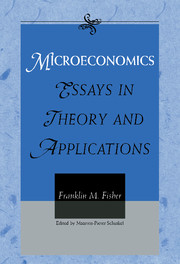Book contents
- Frontmatter
- Contents
- Introduction
- Part I Disequilibrium and Stability
- Part II Welfare Economics and Consumer Theory
- 12 Income Distribution, Value Judgments, and Welfare (1956)
- 13 Income Distribution, Value Judgments, and Welfare: A Correction (1957)
- 14 How Income Ought to Be Distributed: Paradox Lost (1961)
- 15 Advertising and Welfare: Comment (1979)
- 16 Household Equivalence Scales and Interpersonal Comparisons (1987)
- 17 Household Equivalence Scales: Reply (1990)
- 18 Normal Goods and the Expenditure Function (1990)
- Part III Applications of Microeconomic Theory
- Part IV Industrial Organization, Economics, and the Law
- Part V Public Policy Applications
- Epilogue
- Indexes
18 - Normal Goods and the Expenditure Function (1990)
Published online by Cambridge University Press: 20 March 2010
- Frontmatter
- Contents
- Introduction
- Part I Disequilibrium and Stability
- Part II Welfare Economics and Consumer Theory
- 12 Income Distribution, Value Judgments, and Welfare (1956)
- 13 Income Distribution, Value Judgments, and Welfare: A Correction (1957)
- 14 How Income Ought to Be Distributed: Paradox Lost (1961)
- 15 Advertising and Welfare: Comment (1979)
- 16 Household Equivalence Scales and Interpersonal Comparisons (1987)
- 17 Household Equivalence Scales: Reply (1990)
- 18 Normal Goods and the Expenditure Function (1990)
- Part III Applications of Microeconomic Theory
- Part IV Industrial Organization, Economics, and the Law
- Part V Public Policy Applications
- Epilogue
- Indexes
Summary
Introduction
A normal good is one the demand for which increases with income. Despite the simplicity of that definition and the general presumption that most goods are normal, it is surprisingly difficult to relate normality to properties of the utility function. This question was recently studied by Leroux (1987), who gave a sufficient condition for all goods to be normal. Unfortunately, that condition is not easy to interpret.
As with many propositions of consumer theory, however, it turns out that the characterization of normality is very easy to do in terms of the expenditure function. I do so in this paper, giving a necessary and sufficient condition for any particular good to be normal.
Whether this provides a satisfactory solution to the problem posed by Leroux (that of characterizing normality in terms of the utility function), however, is a matter on which reasonable economists can differ. On the one hand, one can argue that the expenditure function codes all the information in the utility function so that characterizing normality in terms of the expenditure function also characterizes it in terms of the utility function. On the other hand, the demand functions themselves also code all the information in the utility function, and one would scarcely take as a solution the answer that one should calculate the demand functions and see whether they increase with income.
In any event, the characterization of normality in terms of the expenditure function has its own independent interest. This is especially so because the proof is very simple and the result quite intuitive.
- Type
- Chapter
- Information
- MicroeconomicsEssays in Theory and Applications, pp. 270 - 272Publisher: Cambridge University PressPrint publication year: 1999



